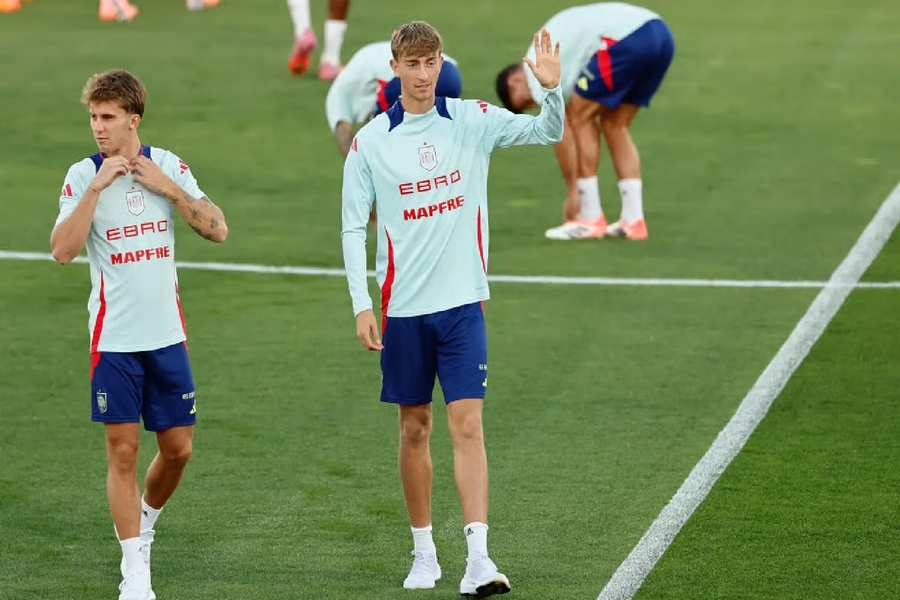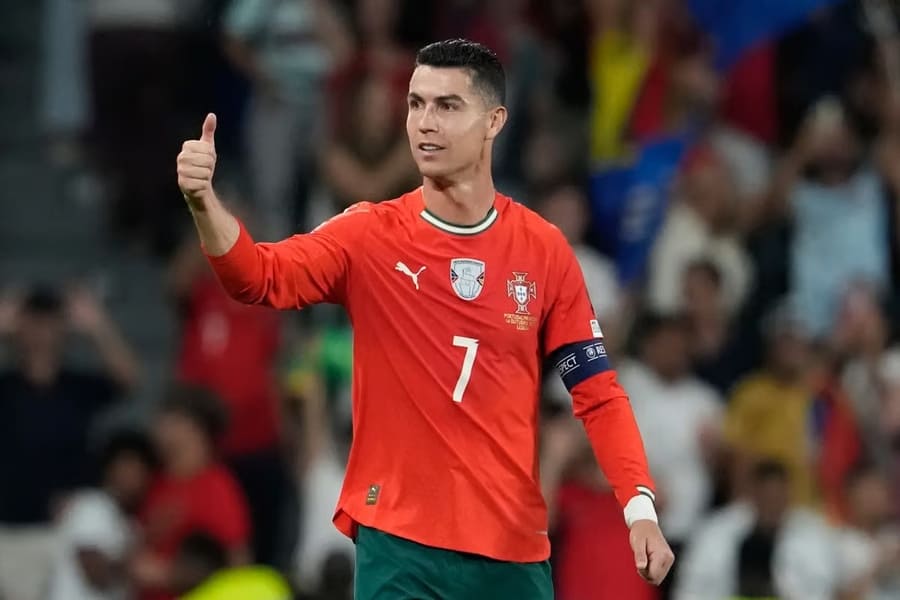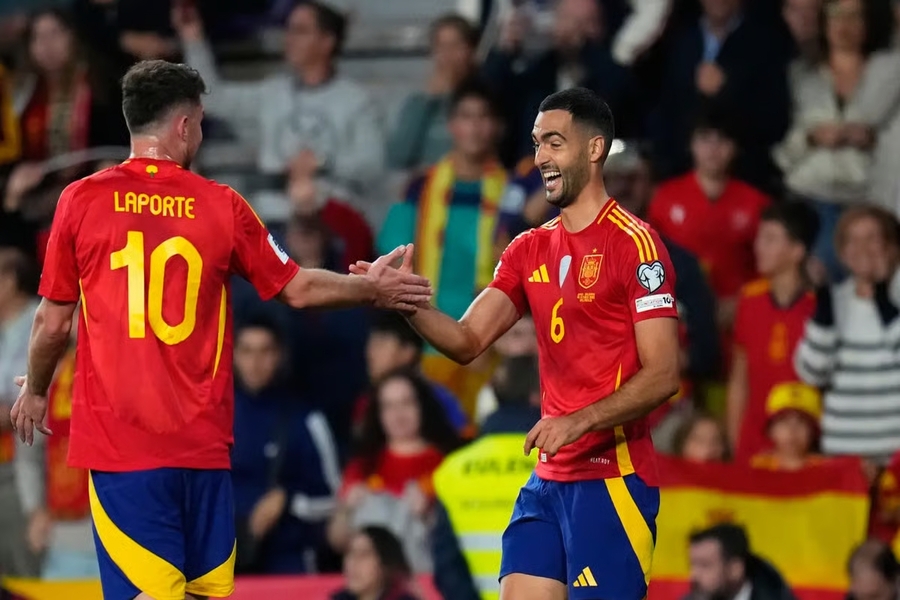Spain has confirmed its excellent form in the European qualifiers for the 2026 World Cup in the United States, Mexico, and Canada, achieving a perfect winning streak after convincingly defeating Georgia (2-0) and Bulgaria (4-0) during the October international break. Luis de la Fuente’s side not only leads its group comfortably but also projects a sense of control, cohesion, and tactical maturity that reinforces Spain’s status as one of Europe’s most in-form teams heading toward the global stage.
Table of contents
Spain 4-0 Bulgaria: a collective exhibition in Valladolid
On Tuesday, Spain delivered a true football masterclass against Bulgaria at the José Zorrilla Stadium, winning 4-0 in a dominant performance from start to finish. Mikel Merino was the standout player, scoring two headers (in the 35th and 56th minutes) and earning the penalty that Mikel Oyarzábal converted in stoppage time. The fourth goal came from a Chernev own goal late in the game.
La Roja’s dominance was overwhelming: 77% possession, over 30 attempts, and a flowing circulation of the ball that suffocated any Bulgarian reaction. Goalkeeper Svetoslav Vutsov prevented an even heavier defeat, but the match confirmed Spain’s collective solidity and the depth of its squad.
With this result, Spain has now achieved four wins in four matches, with 15 goals scored and none conceded, equaling the national record of 29 official games unbeaten, a mark previously set during Vicente del Bosque’s era (2010–2013). Beyond the statistics, what stood out most was the team’s adaptability. Despite missing key players like Lamine Yamal, Rodri, and Nico Williams, Spain maintained its identity and attacking verticality.

Spain 2-0 Georgia: a key step toward group leadership
Just days earlier, on October 11, Spain defeated Georgia 2-0 in Elche, in another demonstration of consistency and tactical control. Goals from Yeremy Pino and Oyarzábal secured a comfortable victory against a well-structured opponent that barely threatened Unai Simón’s goal.
In that game, Spain enjoyed over 80% possession, showing once again a compact and balanced defensive system. Beyond technical superiority, Spain displayed great maturity in managing tempo, something De la Fuente has focused on since Euro 2024: controlling, pressing high, and knowing when to accelerate or slow the game down.
Turkey, the direct rival
Spain’s main competitor in Group E remains Turkey, which has also achieved convincing victories, including a 6-1 win over Bulgaria and a 4-1 triumph against Georgia, with Arda Güler shining as the creative force. With both teams tied on points, their upcoming clash in November is shaping up to be a decisive final for first place, although Spain currently boasts a superior goal difference and greater consistency.
Under Vincenzo Montella, Turkey has become a young, energetic team with a clear identity, but Spain’s experience and balance give it an edge. The outcome of this duel will determine who qualifies directly for the World Cup and who must go through the playoffs.
Europe comes alive with World Cup qualifying drama
Beyond Spain’s group, the European qualifying campaign has offered thrilling battles across the continent. England became the first European team to secure its spot at the 2026 World Cup, showing trademark solidity under Gareth Southgate. Portugal, meanwhile, stumbled to a 2-2 draw with Hungary, tightening the race in that group.
In the north, Norway crushed Israel 5-0, with Erling Haaland netting a hat-trick to continue his remarkable scoring run. Italy beat Estonia 3-1 to stay in contention, while Belgium defeated Wales 4-2 thanks to a decisive performance from Romelu Lukaku. Upsets also emerged — notably Albania’s 1-0 victory over Serbia, shaking up the standings in that group.
These results confirm that, while some teams appear firmly on track, the margin for error is minimal. In such a long and demanding qualification process, squad rotation, physical management, and mental resilience will be crucial in the final stretch.

What we learn at SIA Academy from these matches
At SIA Academy, we follow these matches very closely because they represent an inexhaustible source of learning. In our daily work, we analyze games like Spain 4-0 Bulgaria and Spain 2-0 Georgia so that our players can understand how success is built through collective effort and tactical intelligence.
We pay special attention to how Spain manages to impose its style even when key players are missing, maintaining intensity and concentration throughout every phase of play. We study the mechanisms of high pressing, clean build-up from the back, and smart positional play, concepts we replicate and refine in our training sessions.
We also use these matches as practical case studies in our analysis workshops: breaking down decision-making, off-ball movement, and group mentality. We want our players to realize that talent is only one part of success — the rest comes from preparation, consistency, and understanding the game deeply.
Ultimately, at our academy, we promote the same mindset reflected by the Spanish national team: teamwork, tactical discipline, and the ambition to improve every day. Watching Spain play with such clarity and confidence motivates us and reinforces our mission to train players and coaches capable of interpreting football at that same high level of excellence.
A brilliant journey — but no room for complacency
Spain now faces the decisive stretch of the qualifying campaign with well-earned confidence, but with full awareness that there is still no room for complacency. The showdown with Turkey will be crucial, serving as a true test of Spain’s competitiveness against a strong opponent.
So far, the balance couldn’t be better: a perfect record, zero goals conceded, and a brand of football that is dynamic, intense, and effective. If the progression continues, La Roja will arrive at the 2026 World Cup as one of the world’s most complete and in-form teams — combining experience, young talent, and a recognizable footballing identity that has reignited excitement across the country.






